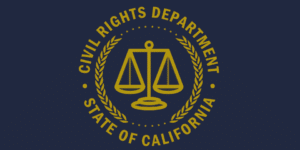Updated September 22, 2025
How to Protect Your Employee Rights During a Workplace Investigation
Facing an HR investigation at work? Your employee rights during HR investigation are often the last thing on your mind when that unexpected meeting request arrives.
Despite your years of service or spotless record, workplace investigations can leave even the most confident professionals feeling vulnerable and exposed. While HR departments claim to be neutral parties, the reality is that they primarily serve company interests—not yours.
Fortunately, you don't have to navigate this challenging process alone or unprepared. Understanding your legal protections can make the difference between preserving your career and suffering unnecessary consequences.
Many employees make critical mistakes during investigations simply because they don't know what they can and cannot do. From speaking too freely without representation to failing to document key conversations, these errors can significantly impact the outcome of your case.
This comprehensive guide will walk you through each stage of an HR investigation, from the initial notification to the final resolution. You'll learn exactly what rights you have, how to protect yourself professionally, and when to seek additional support if the process seems unfair.
Let's ensure you're equipped to handle this challenging situation with confidence and clarity.
Understand the HR Investigation Process
When workplace misconduct surfaces, HR departments spring into action through formal investigations. Understanding the process helps you navigate what can be an intimidating experience while protecting your rights throughout.
What triggers an HR investigation
HR investigations don't happen randomly—they respond to specific workplace issues. Most investigations begin when someone reports conduct that violates company policies or laws. Common triggers include:
- Harassment or discrimination complaints
- Allegations of theft or fraud
- Policy violations (safety breaches, substance abuse)
- Conflicts between coworkers
- Reports of retaliation
For employers, certain complaints must be investigated according to federal law. These include allegations related to discrimination based on protected characteristics covered by Title VII of the Civil Rights Act, the Age Discrimination in Employment Act, the Americans with Disabilities Act, and other federal protections [1].
Additionally, investigations are necessary when considering adverse actions against employees, such as termination, demotion, or reassignment [2]. Employers typically investigate even non-legal complaints that indicate potential workplace issues to prevent them from escalating into serious problems later.
Who conducts the investigation
The investigator's role is crucial for maintaining fairness and credibility. Depending on the organization and situation, investigations may be conducted by:
- HR professionals
- In-house counsel
- Department administrators
- External investigators or attorneys
The key consideration is that investigators must remain impartial and objective. According to workplace investigation best practices, investigators should possess:
- Proper training and knowledge of employment laws
- No personal relationship with anyone involved
- No stake in the investigation's outcome
- Attention to detail and sensitivity
- Trustworthiness [1]
For serious allegations or cases involving high-ranking employees, companies often engage external investigators to ensure neutrality [3]. This approach helps avoid potential conflicts of interest that might compromise the investigation's integrity.
What to expect as an employee
Initially, you'll receive notification about the investigation, though details provided may be limited. If you're directly involved, you'll likely be interviewed, either as the complainant, respondent, or witness [4].
During interviews, expect the investigator to:
- Ask direct questions about what you observed or experienced
- Request relevant documents or evidence
- Take detailed notes
- Maintain professional demeanor
Remember that while the process aims to be fair, investigators are not on your side—they're neutral fact-finders. Consequently, you should answer questions truthfully but concisely, sticking to facts rather than speculation.
Most companies request confidentiality during investigations, though complete confidentiality cannot be guaranteed [4]. The timeline varies based on complexity, but organizations typically aim to complete investigations promptly to minimize workplace disruption.
After the investigation concludes, you may receive information about the findings, particularly if you were the complainant or respondent. Possible outcomes include disciplinary action, policy changes, or no further action depending on what the evidence supports [5].
Throughout this process, knowing your employee rights during HR investigation provides crucial protection and helps you navigate this challenging experience effectively.
Know Your Rights Before the Investigation Starts
Preparing yourself before an HR investigation begins is crucial for protecting your interests and maintaining your professional standing. The moments after you first learn about an investigation are critical – this is when you must quickly understand your rights to navigate the process effectively.
Right to be informed of the investigation
First and foremost, you have the right to know that an investigation has been initiated. Your employer should provide basic information about the allegations against you. This transparency is fundamental to a fair process and allows you to prepare your response appropriately.
You should receive information about:
- The nature of the complaint or concern
- The purpose of the investigation
- The general process that will be followed
Most importantly, this notification should happen before any formal interviews take place. If you're called into a meeting without prior notice about an investigation, you can request clarification about its purpose before proceeding. As an employee, you should never be caught completely by surprise by an HR investigation.
Right to review company policies and contracts
Before participating in any investigation, thoroughly review your:
- Employee handbook
- Company code of conduct
- Employment contract
- Relevant departmental policies
These documents often outline investigation procedures, expected timelines, and potential outcomes. Understanding these policies helps you recognize whether proper protocols are being followed and what rights you have throughout the process.
Moreover, these documents may specify:
- How interviews are conducted
- Whether recordings or notes will be taken
- Who has access to investigation materials
- What confidentiality requirements exist
You also have the right to request a copy of your personnel file, which contains your employment history, performance reviews, and any prior disciplinary actions. Reviewing this information helps you understand the full context in which your case might be evaluated.
Right to legal representation or support
In many workplace investigations, you have the right to some form of representation or support, though the specifics vary based on your employment situation.
For union members, this right is typically guaranteed through collective bargaining agreements. Union employees generally have the right to have a representative present during investigative interviews.
For non-union employees, the situation varies:
- Some companies explicitly allow representation during interviews
- Others may permit it upon request
- Some may deny outside representation entirely
Regardless of formal policies, you can always seek advice from an employment attorney before participating in an investigation. An attorney can review documents you're asked to sign, prepare you for interviews, and advise you on how to protect your rights throughout the process.
Remember that HR representatives, despite seeming sympathetic, work for the company – not for you. Their primary duty is to protect the organization's interests. Having independent support ensures someone is looking out specifically for your welfare during what can be a stressful and consequential process.
Above all, document everything from the moment you learn about the investigation – this record may prove invaluable if you need to demonstrate procedural issues or unfair treatment later.
How to Protect Yourself During the Investigation
Once an HR investigation is underway, your actions and responses become critical to protecting your professional interests and rights. How you conduct yourself during interviews, what information you share, and how you document the process can significantly impact the outcome.
Stay calm and professional in interviews
Naturally, feeling anxious or defensive during an investigation is normal, but maintaining composure is essential. Your demeanor during interviews affects how your statements are perceived and evaluated. Take deep breaths before meetings to steady your nerves, and consider bringing prepared notes to help maintain focus.
As one HR director notes, "You are working with humans. People have baggage—and you need to be sensitive to that, so you don't unintentionally traumatize someone in the process of correcting a wrong in the workplace" [1]. This perspective applies to both investigators and participants.
Provide honest and factual information
Honesty serves as your best protection throughout the investigation process. When responding to questions:
- Stick precisely to facts as you know them
- Provide specific details including dates, times, and people involved when possible
- Admit clearly when you don't remember something
- Avoid introducing unrelated issues into the discussion
Remember that misleading investigators or omitting key information can severely damage your credibility and potentially lead to serious consequences if discovered later [5].
Avoid speculation or emotional responses
In essence, offering guesses, speculation, or opinions about what happened or others' motives can undermine your position. Even when pressed, only share what you personally witnessed or know with certainty.
Investigators are trained to remain neutral and avoid leading questions [1]. Similarly, you should maintain objectivity in your responses. Emotional outbursts or accusations may be noted in the investigation record and could potentially weaken your position.
Take notes and document everything
Subsequently, keeping your own detailed record of the investigation process provides valuable protection. Maintain a personal log documenting:
- Meeting dates and times
- Names of everyone present
- Questions asked and your responses
- Any instructions provided by HR or investigators
Written documentation can help you recall important details if questions arise later [5]. Furthermore, as one expert notes, "The best workplace investigation is only as good as the reports that capture the details" [6]. Your personal documentation creates an independent record of events.
Respect confidentiality agreements
Importantly, most companies require confidentiality during investigations—and for good reason. The National Labor Relations Board has ruled that employers may justify confidentiality requirements during ongoing investigations [7]. Respecting these requirements means:
- Avoiding discussions about the investigation with coworkers
- Not sharing details about interviews or questions
- Refraining from posting about the investigation on social media
Breaking confidentiality can potentially lead to disciplinary action and complicate the investigation process [5]. Nevertheless, this doesn't prevent you from consulting with legal counsel about your employee rights during HR investigation.
Throughout the process, remember that while HR attempts to conduct fair investigations, their primary duty is to the organization. Your careful approach helps ensure both the investigation's integrity and your own protection.
What to Do If You Feel Your Rights Are Violated
Despite your best efforts to navigate an HR investigation properly, violations of your rights can still occur. Knowing how to identify and address these violations is crucial for protecting your career and wellbeing.
Recognize signs of retaliation or bias
Retaliation occurs when employers punish employees for engaging in legally protected activities. Unfortunately, retaliation claims represent approximately 60% of all EEOC charges [8]. Watch for these warning signs:
- Employment changes: Termination, demotion, transfer to less desirable positions, reduced hours, or decreased pay shortly after your complaint
- Performance issues: Sudden negative reviews despite previous positive feedback
- Workplace isolation: Being excluded from meetings, training opportunities, or workplace events
- Hostile treatment: Increased micromanagement, verbal abuse, or encouragement of others to treat you poorly
The standard for proving retaliation requires showing that the manager's action might deter a reasonable person from opposing discrimination or participating in the complaint process [9]. Notably, even actions years after your complaint could qualify as retaliation if other evidence establishes a connection [9].
Understand your privacy rights
During investigations, employers must balance their need to gather information against your privacy rights. You have protection against:
- Unreasonable searches of personal phones without consent
- Demands for personal passwords or login information
- Requests for confidential health records
- Recording interviews in violation of wiretapping laws
- Surveillance conducted without business justification [10]
Although employers often have wide latitude to monitor work devices and search work areas (especially if outlined in your employment contract), these powers aren't unlimited [10]. Confidentiality is another critical right—information should only be shared on a need-to-know basis [11].
When to escalate to HR or legal counsel
First, document everything thoroughly, including dates, names, and detailed descriptions of incidents. In the event that your immediate supervisor or HR representative dismisses your concerns, consider these escalation steps:
- Request to speak with higher-level HR management
- Consult your company's escalation policy for guidance on when investigations should be elevated beyond the HR department [12]
- Seek legal counsel immediately if you experience:
- Clear retaliation after filing a complaint
- Privacy violations during the investigation
- Failure to follow established company policies
- Defamatory statements spread about you [10]
Remember that involving an attorney early provides valuable protection. Legal counsel can help place communications under attorney-client privilege and provide guidance throughout the process [13]. Meanwhile, consultation with an employment attorney is particularly advisable if you believe your rights have been violated [11].
Steps to Take After the Investigation Ends
The conclusion of an HR investigation doesn't always mark the end of your journey. Recent data shows that issue resolution rates have dropped from 70% in 2019 to just 59% in 2024 [14], leaving many employees with lingering concerns. Accordingly, taking deliberate steps after the investigation concludes is essential to protect your rights and ensure appropriate resolution.
Request a summary of the outcome
Once the investigation concludes, you have the right to receive notification through an investigation closure letter. This document should provide basic information about the findings without compromising confidentiality. While the letter may not detail specific disciplinary actions, it should confirm whether misconduct occurred and if corrective measures will be implemented [15].
For transparency, request documentation that:
- Outlines factual findings established during the investigation
- Identifies issues that couldn't be substantiated
- Acknowledges any mitigating circumstances considered
If the summary seems vague or incomplete, politely request clarification while respecting confidentiality constraints that may limit what can be shared.
Follow up on unresolved concerns
Roughly 41% of workplace investigations end without satisfactory resolution [14]. If your concerns remain unaddressed, consider requesting:
- Regular check-ins with HR to monitor the situation
- Transfer to a different department if working with the other party is problematic
- Adjustments to your schedule or work arrangement to minimize uncomfortable interactions
Document all follow-up communications regarding unresolved issues, as these records may prove valuable if problems persist or escalate.
Seek emotional or legal support if needed
Investigations can be mentally and emotionally draining. Consider accessing:
- Employee assistance programs for confidential counseling
- Mediation services for resolving ongoing conflicts
- Alternative dispute resolution processes [15]
Remember that only 6% of organizations currently have structured aftercare processes [14], hence you may need to proactively seek support. If the investigation revealed serious violations of your employee rights during HR investigation or if you experienced retaliation, consulting with an employment attorney might be necessary to understand potential legal remedies and next steps.
Protecting Your Employee Rights: Final Thoughts
Workplace investigations undoubtedly create stressful situations for even the most seasoned professionals. Throughout this guide, we've examined essential strategies to safeguard your rights and navigate these challenging circumstances effectively.
Your rights matter significantly during every phase of an HR investigation. Consequently, understanding the investigation process, knowing your entitlements, maintaining professionalism, and documenting everything provides your best defense against potential mistreatment.
Remember that HR departments serve company interests first, regardless of how friendly or supportive they might appear. Therefore, approaching investigations with appropriate caution protects your career and wellbeing. Facts remain your strongest allies – stick to them while avoiding speculation or emotional responses that might undermine your position.
Documentation serves as your most powerful tool throughout this process. Evidence of communications, meeting notes, and records of any questionable treatment can make the difference between a fair outcome and an unjust one. Additionally, seeking appropriate support – whether from union representatives, colleagues, or legal counsel – ensures someone advocates specifically for your interests.
Most importantly, workplace investigations eventually end, but their effects can linger. Post-investigation support appears particularly lacking across organizations, with only 6% offering structured aftercare processes. This gap means you must actively advocate for resolution and healing afterward.
The workplace should provide safety, fairness, and respect for all employees. Though investigations challenge these ideals, they also present opportunities to address misconduct and improve workplace culture. Armed with knowledge about your employee rights during HR investigations, you stand prepared to protect yourself while contributing to a more equitable work environment.
Your career deserves protection – these strategies ensure you navigate investigations with confidence, clarity, and the full exercise of your rights.
References
[1] – https://www.bamboohr.com/blog/how-to-conduct-hr-investigation
[2] – https://www.employerscouncil.org/resources/workplace-investigations-guide/
[3] – https://www.charlastevensconsulting.com/the-anatomy-of-a-workplace-investigation/
[4] – https://hr.northwestern.edu/for-managers/hr-consulting/resolving-workplace-issues/workplace-investigation.html
[5] – https://www.justiceatwork.com/tips-for-employees-during-workplace-investigations/
[6] – https://www.caseiq.com/resources/documenting-workplace-investigation-interviews-in-3-steps/
[7] – https://www.sullcrom.com/SullivanCromwell/_Assets/PDFs/Memos/SC-Publication-NLRB-Employers-May-Maintain-Confidentiality-of-Ongoing-Workplace-Investigations.pdf
[8] – https://ablinlaw.com/articles/2024/02/15/a-checklist-for-employers-investigating-workplace-retaliation-complaints/
[9] – https://www.eeoc.gov/retaliation-making-it-personal
[10] – https://www.shouselaw.com/ca/blog/workplace-investigations-employee-rights/
[11] – https://www.kallaw.com/california-workplace-investigations-employee-rights-and-legal-procedures/
[12] – https://www.employmentlawinsights.com/2025/01/investigations-employers-can-avoid-getting-in-their-own-way-with-some-planning/
[13] – https://www.primmer.com/blog/workplace-misconduct-investigations-how-involving-legal-counsel-can-help-employers-mitigate-risk-for-your-organization/
[14] – https://www.hracuity.com/blog/issue-resolution-rates-are-declining-where-are-we-going-wrong/
[15] – https://www.privatecompanydirector.com/navigate-aftermath-workplace-investigation/
Call Setyan Law at (213)-618-3655 to schedule a free consultation.






